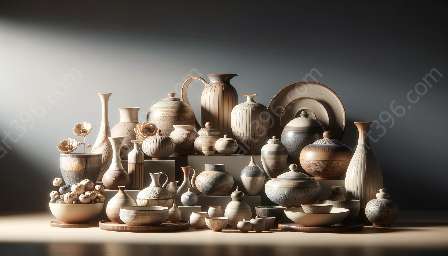Creating ceramics and working with clay have been known to have profound psychological effects, influencing human emotions, mentality, and well-being. In this topic cluster, we will delve into the fascinating relationship between ceramics and the human psyche, exploring the impact of ceramics techniques and the art itself on mental health and emotional well-being.
Ceramics Techniques: A Therapeutic Journey
When we think of ceramics, we often envision the process of molding, shaping, and firing clay to create beautiful art pieces. However, the act of working with ceramics goes beyond just creating tangible objects. It involves a therapeutic journey that encompasses both the physical and psychological aspects of human experience.
Many ceramics techniques, such as hand-building, throwing on a wheel, glazing, and firing, require concentration, attention to detail, and a deep connection with the material. This hands-on engagement stimulates the mind, allowing individuals to enter a state of flow where they are fully absorbed in the creative process. This state of flow is associated with increased feelings of happiness, fulfillment, and reduced stress levels.
Moreover, the tactile nature of working with clay provides a sensory experience that can be exceptionally soothing. The act of kneading and shaping clay can have a grounding effect, promoting mindfulness and a sense of calm. As the clay takes form under the artist's hands, a profound connection is established, fostering a sense of accomplishment and self-expression.
The Art of Ceramics: Expressing Emotions and Stories
Ceramics as an art form serves as a powerful medium for expressing emotions, stories, and narratives. Whether through the creation of functional pottery or intricate sculptures, artists can imbue their pieces with personal meanings and symbolism, which can evoke deep emotional responses from both the creator and the audience.
Art therapy utilizing ceramics has been widely recognized as a beneficial practice for individuals struggling with various psychological challenges. The tactile and expressive nature of clay provides a nonverbal outlet for emotional expression, allowing individuals to communicate, process, and heal from their inner turmoil. The act of shaping and forming clay can be a cathartic experience, enabling artists to externalize their emotions and find solace in the creative process.
Moreover, the communal aspect of ceramics, such as belonging to a pottery class or studio, can foster a sense of community and connectedness. Engaging in the art of ceramics alongside like-minded individuals can provide a support network and a shared space for personal growth and emotional exploration. The shared experience of creating ceramics can create bonds and friendships, enhancing overall well-being and mental resilience.
The Emotional Impact of Ceramics
Working with ceramics and engaging with the art form can have a profound emotional impact that extends beyond the act of creation. The process of seeing a clay piece transform into a finished ceramic object can instill a sense of pride and accomplishment, boosting self-esteem and self-efficacy. Artists often form strong emotional attachments to their creations, which can serve as tangible reminders of their creative journey and personal growth.
Furthermore, the act of giving or receiving a handmade ceramic piece can evoke feelings of warmth, appreciation, and love. Whether it's a handmade mug, a decorative bowl, or a sculptural artwork, ceramics carry the emotional essence of the creator, creating meaningful connections between individuals. The exchange of ceramic pieces can convey heartfelt sentiments and strengthen interpersonal relationships, leaving lasting impressions on both the giver and the recipient.
Conclusion
The psychological effects of ceramics are far-reaching, encompassing therapeutic benefits, emotional expression, and social connections. By understanding the profound impact of ceramics on the human psyche, we can appreciate the art form not only for its aesthetic value but also for its role in promoting mental well-being and emotional enrichment. Whether you are a practicing ceramic artist or someone interested in exploring the world of ceramics, the psychological effects of ceramics highlight the transformative power of art in nurturing the human spirit.

